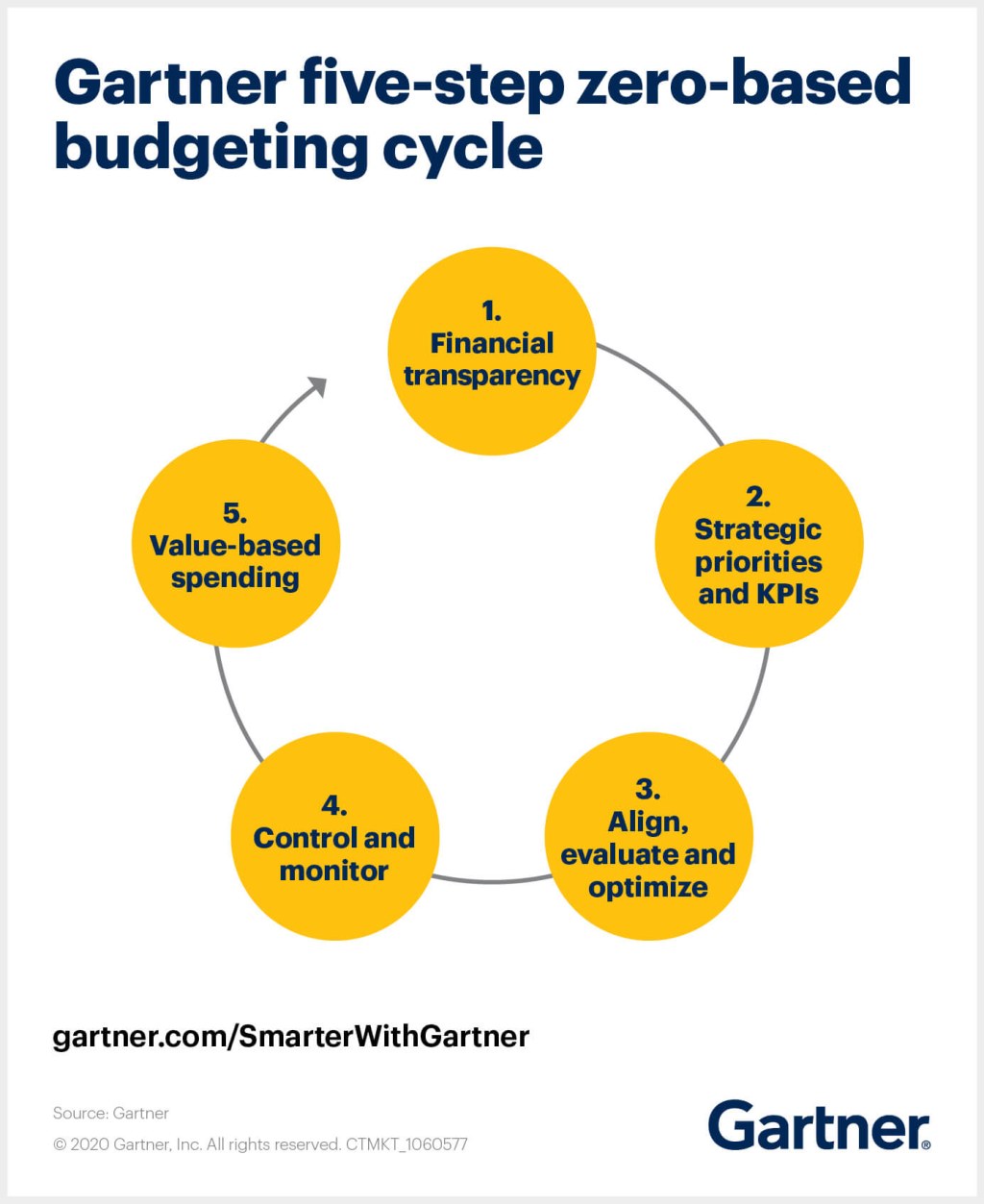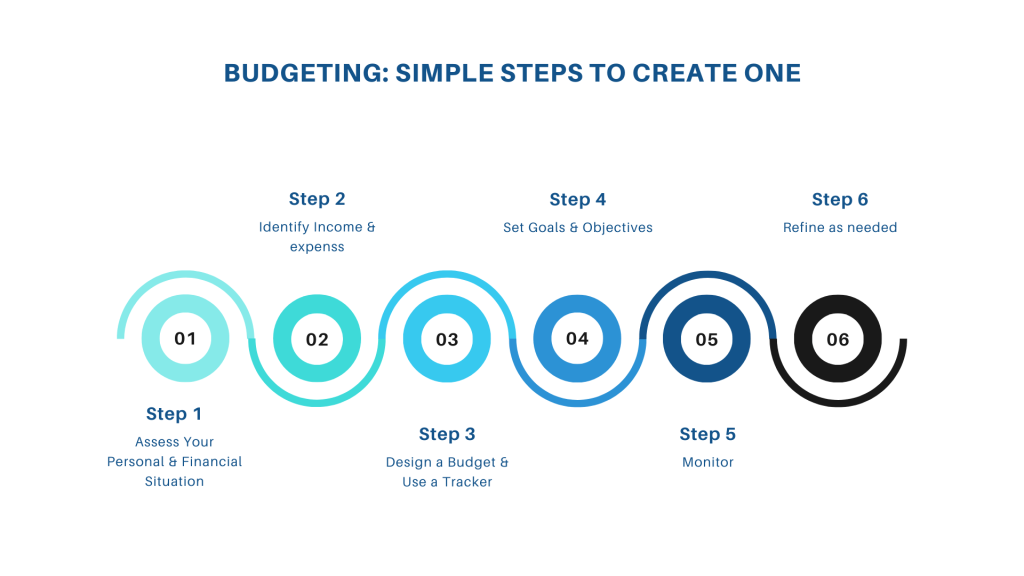5 Budgeting Steps: Manage Your Finances Like a Pro
Introduction
Hello, Readers!
Welcome to our informative guide on budgeting. In today’s fast-paced world, financial management is crucial, and budgeting plays a significant role in achieving financial stability and success. Whether you’re a young professional starting your career or a seasoned individual looking to improve your financial situation, these 5 budgeting steps will help you take control of your money and make smarter financial decisions. Let’s dive in!
Step
Description

Image Source: gcom.cloud
Step 1: Set Financial Goals
Define your short-term and long-term financial objectives.
Step 2: Track Your Income and Expenses
Monitor your earnings and expenditures to gain a clear understanding of your financial inflows and outflows.
Step 3: Create a Budget
Develop a comprehensive budget that aligns with your financial goals and helps you allocate your income wisely.
Step 4: Cut Unnecessary Expenses
Identify and eliminate unnecessary expenses to save money and improve your financial situation.
Step 5: Review and Adjust Regularly
Regularly review your budget, track your progress, and make necessary adjustments to stay on track towards your financial goals.
Step 1: Set Financial Goals

Image Source: wealthcrafts.in
What are financial goals? Financial goals are specific objectives you set to achieve in the short or long term. They can be saving for a down payment on a house, paying off student loans, or building an emergency fund.
Who should set financial goals? Everyone should set financial goals, regardless of their income level or age. Financial goals provide direction and purpose to your financial journey.
When should you set financial goals? It’s never too late to start setting financial goals. However, the earlier you define your objectives, the more time you have to work towards them and benefit from compound interest.
Where should you record your financial goals? Write down your financial goals in a journal, create a vision board, or use a goal-tracking app. Find a method that works best for you.
Why are financial goals important? Financial goals provide focus, motivation, and a sense of accomplishment. They help you prioritize your spending and make informed financial decisions.
How can you set effective financial goals? Start by identifying your priorities, breaking them down into realistic and measurable objectives, and creating a timeline to achieve them.
Conclusion: Setting financial goals is the first step towards taking control of your finances and achieving financial success. By defining your objectives, you create a roadmap that guides your financial decisions and helps you make progress towards a secure financial future.
Step 2: Track Your Income and Expenses
What is income tracking? Income tracking involves recording and categorizing every source of income you receive, such as salary, freelance earnings, or investment returns.
Who should track their income and expenses? Everyone, regardless of their income level, should track their financial inflows and outflows. It provides clarity and awareness of your spending habits.
When should you track your income and expenses? Track your income and expenses regularly, preferably on a monthly basis. This allows you to identify patterns, detect financial leaks, and make necessary adjustments.
Where should you track your income and expenses? You can use various tools and apps, such as spreadsheet software or dedicated budgeting apps, to track your income and expenses. Choose a method that suits your preferences.
Why is tracking income and expenses important? Tracking your income and expenses helps you understand where your money is going, identify areas for improvement, and make informed decisions about your spending habits.
How can you track your income and expenses effectively? Start by creating categories for your income and expenses, record each transaction accurately, and regularly review your tracking to gain insights into your financial habits.
Conclusion: Tracking your income and expenses is an essential step towards maintaining financial awareness and making informed financial decisions. By keeping a record of your financial inflows and outflows, you gain control over your money and can identify areas where you can save and invest.
Step 3: Create a Budget
What is a budget? A budget is a financial plan that outlines your income, expenses, and savings goals. It helps you allocate your money effectively and prioritize your spending.
Who should create a budget? Everyone should create a budget to have a clear understanding of their financial situation and make intentional choices about their spending.
When should you create a budget? It’s best to create a budget at the beginning of each month or whenever there are significant changes in your income or expenses.
Where should you create a budget? You can use budgeting apps, spreadsheets, or pen and paper to create your budget. Choose a method that suits your preferences and makes it easy for you to track your finances.
Why is creating a budget important? A budget allows you to see where your money is going, helps you set financial goals, and enables you to make informed decisions about your spending and saving.
How can you create an effective budget? Start by listing all your sources of income and categorizing your expenses. Set realistic spending limits for each category and track your progress regularly.
Conclusion: Creating a budget is a crucial step in managing your finances effectively. It provides a clear overview of your income, expenses, and savings goals, allowing you to make intentional choices about how you allocate your money.
Step 4: Cut Unnecessary Expenses
What are unnecessary expenses? Unnecessary expenses are non-essential purchases or recurring costs that don’t align with your financial goals. They can include dining out frequently, subscription services you don’t use, or impulse purchases.
Who should cut unnecessary expenses? Everyone can benefit from cutting unnecessary expenses. It frees up money that can be redirected towards savings, debt repayment, or investments.
When should you cut unnecessary expenses? Review your expenses regularly to identify unnecessary spending. You can start by analyzing your monthly bills and discretionary spending.
Where can you cut unnecessary expenses? Look for areas where you can make adjustments, such as reducing dining out, canceling unused subscriptions, or negotiating lower utility bills.
Why should you cut unnecessary expenses? Cutting unnecessary expenses allows you to save money, reach your financial goals faster, and improve your overall financial well-being.
How can you effectively cut unnecessary expenses? Start by tracking your expenses, identifying areas for improvement, and making conscious decisions about your spending. Prioritize your financial goals over short-term gratification.
Conclusion: Cutting unnecessary expenses is a powerful strategy to improve your financial situation and achieve your financial goals. By eliminating non-essential spending, you create room for saving, debt repayment, and investments, ultimately leading to a healthier financial future.
Step 5: Review and Adjust Regularly
What does it mean to review and adjust your budget? Reviewing and adjusting your budget involves regularly assessing your financial progress, identifying areas that require improvement, and making necessary changes to stay on track.
Who should review and adjust their budget? Everyone should review and adjust their budget to ensure it remains aligned with their financial goals and reflects any changes in their income, expenses, or priorities.
When should you review and adjust your budget? Review your budget at least once a month or whenever there are significant changes in your financial situation. This allows you to stay proactive and make timely adjustments.
Where should you review and adjust your budget? Set aside dedicated time to review your budget, whether it’s using a spreadsheet on your computer or a budgeting app on your phone. Find a quiet and comfortable space where you can focus.
Why is it important to review and adjust your budget regularly? Regularly reviewing and adjusting your budget ensures that it remains relevant, reflects your current financial situation, and helps you adapt to any changes or challenges that may arise.
How can you effectively review and adjust your budget? Review your income, expenses, and progress towards your financial goals. Identify areas where you can make improvements, such as cutting back on certain expenses or reallocating funds to align with your priorities.
Conclusion: Regularly reviewing and adjusting your budget is essential to maintain control over your finances and ensure that you’re on track towards your financial goals. By staying proactive and making necessary adjustments, you can adapt to changing circumstances and make informed financial decisions.
Advantages and Disadvantages of 5 Budgeting Steps: Pros and Cons
Advantages of 5 Budgeting Steps:
1. Improved financial awareness and control: By following these budgeting steps, you gain a better understanding of your financial situation and can take control of your money.
2. Clear financial goals and priorities: The budgeting steps help you define and prioritize your financial goals, giving you a sense of direction and purpose.
3. Increased savings and reduced debt: By tracking your expenses, cutting unnecessary costs, and creating a budget, you can save more money and pay off debts faster.
4. Better financial decision-making: Budgeting enables you to make informed decisions about your spending, ensuring that your money aligns with your values and goals.
5. Greater financial security and peace of mind: By managing your finances effectively, you can build an emergency fund, prepare for unexpected expenses, and experience less financial stress.
Disadvantages of 5 Budgeting Steps:
1. Initial time and effort: Implementing these budgeting steps requires time and effort to track expenses, create a budget, and regularly review your progress.
2. Potential for unexpected expenses: Despite careful planning, unexpected expenses can still arise, challenging the effectiveness of your budget. However, having a budget can better prepare you to handle such situations.
3. Discipline and self-control: Following a budget and cutting unnecessary expenses requires discipline and self-control, which may be difficult for some individuals.
4. Lifestyle adjustments: Budgeting may require making lifestyle adjustments, such as reducing discretionary spending or finding ways to increase income, which can be challenging for some individuals.
5. Constant monitoring and adjustments: To ensure the effectiveness of your budget, you need to regularly monitor and adjust it. This ongoing commitment may be challenging for individuals with limited time or attention.
Frequently Asked Questions (FAQ)
1. How long does it take to see the results of budgeting?
It depends on various factors, such as your financial situation and the extent to which you follow your budget. Some individuals may see immediate results, while others may take several months to experience significant changes. Consistency and perseverance are key.
2. Can budgeting help me save for large financial goals, such as buying a house?
Absolutely! Budgeting allows you to allocate a portion of your income towards saving for specific goals. By consistently saving and cutting unnecessary expenses, you can make significant progress towards your financial goals, including buying a house.
3. How often should I review and adjust my budget?
It’s recommended to review and adjust your budget at least once a month. However, major life events, changes in income, or shifts in priorities may require more frequent adjustments. Stay proactive to ensure your budget remains effective.
4. Can budgeting help me get out of debt?
Yes, budgeting is an effective tool for debt repayment. By allocating a portion of your income towards debt payments and cutting unnecessary expenses, you can accelerate your debt payoff journey and achieve financial freedom.
5. What if I have irregular income? Can I still create a budget?
Absolutely! Budgeting is still possible with irregular income. Start by estimating your average monthly income and setting aside a portion for essential expenses, savings, and debt payments. Flexibility is key when dealing with irregular income.
Conclusion
Friends, taking control of your finances through budgeting is an empowering step towards financial freedom. By following these 5 budgeting steps – setting financial goals, tracking income and expenses, creating a budget, cutting unnecessary expenses, and regularly reviewing and adjusting – you can achieve your financial objectives and enjoy greater financial well-being. Start your budgeting journey today and pave the way for a more secure and prosperous future.
Final Remarks: The information provided in this article is for educational and informational purposes only. It should not be considered